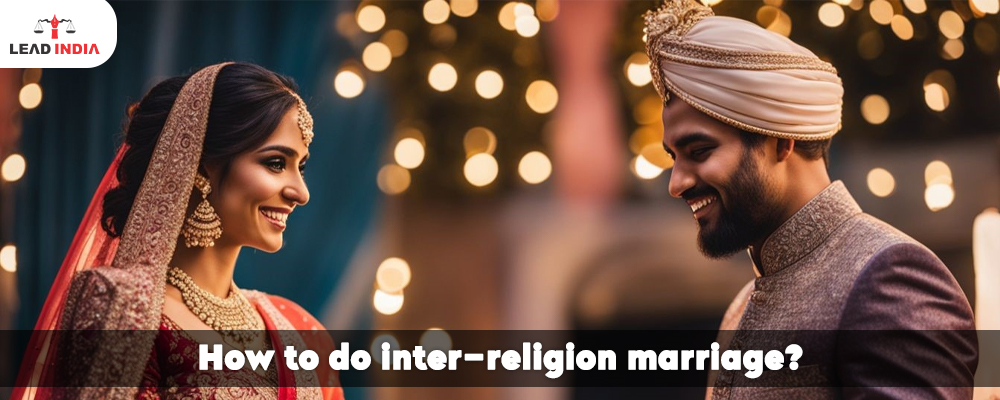In a world of diversity and globalization, we are rich in culture and religion. India is one of the countries known for its rich culture and religious diversity, it has a long history of inter-religious marriage. As people from different faiths and backgrounds come together, they bring with them their unique cultural, social, and spiritual practices. The Special Marriage Act, of 1954 validated and registered inter-religious marriage in India. It allows the two individuals to solemnize their marriage through a civil contract. In this Act, no religious formalities are need to be carry out to marry.
What is Inter–Religion marriage?
Inter-religion marriage means a marriage between two individuals who belong to different religious backgrounds or cultures. It is a union between two people who have different religious beliefs, practices, and traditions.
Inter-religion can be take in many forms:-
- Hindu – Muslim marriage
- Christian- Jewish marriage
- Buddhist-Christian marriage
Law related to inter-religious marriages is Special Marriage Act 1954 is an Indian law that provides a legal framework for the marriage of people of different religions, faiths, or castes.
Need A Legal Advice
The internet is not a lawyer and neither are you. Talk to a real lawyer about your legal issue

What is the Special Marriage Act?
The Special Marriage Act, of 1954 is an Indian legal framework for the marriage of people belonging to different religions, cultures, faiths, or castes. Both civil and religious marriages are accept in our country, India. Interfaith couples have alternatives to religious marriage regulations according to the Special Marriage Act of 1954. This Act not only applies to Indians who belong to different religions but to Indian nationals who live abroad. The marriage officer registers a marriage under the Act, it is record in the Marriage Certificate Book and is consider lawful, which means that the child born from that marriage will also be considered a legitimate child.
Who is eligible to marry under the Special Marriage Law?
• The individual should be Single or Divorced.
• The person must be capable of giving consent.
• The parties are not to suffer from any mental disorder.
• The age criteria for marriage (male 21 and female 18 )
• The parties are not prohibit by law.
Steps to enter into inter-religion marriage:-
Step 1: Eligibility criteria must be fulfill
The couple must be at least 21 years old (male ) and 18 years ( female). Both parties must be mentally sound and capable of giving valid consent. The couples must not be related by blood or marriage as per special.
Step 2: Choose the appropriate Act
The couples must decide which act they want to register for their marriage.
Step 3: All the documents are prepare
proof of age, proof of identity, proof of residence (ration card, etc), passport-size photographs, Affidavit stating that the couple is not related by blood or marriage.
Step 4: Notice must be submit
The couple must submit a notice to the marriage registrar in the district where they intend to get marry. The notice must be submit within 30 days prior to the date of marriage. The notice must include the couple’s details, including Name, age, address, and occupation.
Step 5: Waiting period of 30 days
The couples must wait for 30 days after submitting the notice before getting marry. During this period anyone can object to the marriage if they have a valid reason.
Step 6: Performance of marriage
The couple got marry after a 30-day waiting period. The marriage must be perform by a licensed marriage office.
Step 7: Register the Marriage
The couple must register their marriage with the marriage registrar within 30 days. The couple gets the marriage certificate
Step 8: Obtain the marriage certificate
The marriage registrar will issue a marriage certificate to the couple after registration. The certificate is proof of the couple’s marriage and is require for various purposes, such as obtaining a passport, visa, etc.
Practical Tips for easily inter- religion marriage
- Take legal aid from an expert lawyer.
- Communicate openly with the lawyer.
Case laws
Lata Singh v. State of UP (2006)
The Supreme Court held that inter-caste and inter-religion marriages are valid and recognized under the Special Marriage Act, of 1954.
Noor Jahan Begam v. State of UP (2014)
The court held that a Muslim woman has a choice to marry a non-Muslim man without conversion under the Special Marriage Act, of 1954.
Conclusion
In India, interfaith marriages are possible by the Special Marriage Act of 1954. In India, interfaith marriage is not just a matter of personal preference but also a social and cultural occurrence that represents the nation’s rich cultural legacy and variety. A lovely display of love and dedication between two people from diverse backgrounds is an interfaith marriage. Finally, we may state that the Indian legal system has made an effort to offer a foundation for interfaith marriage through the Special Marriage Act, of 1954 and other court rulings.
One can talk to a lawyer from Lead India Law for any kind of legal support. In India, free legal advice online can be obtain at Lead India. Along with receiving free legal advice online, one can also ask questions to the experts online free through Lead India.





 Talk to a Lawyer
Talk to a Lawyer